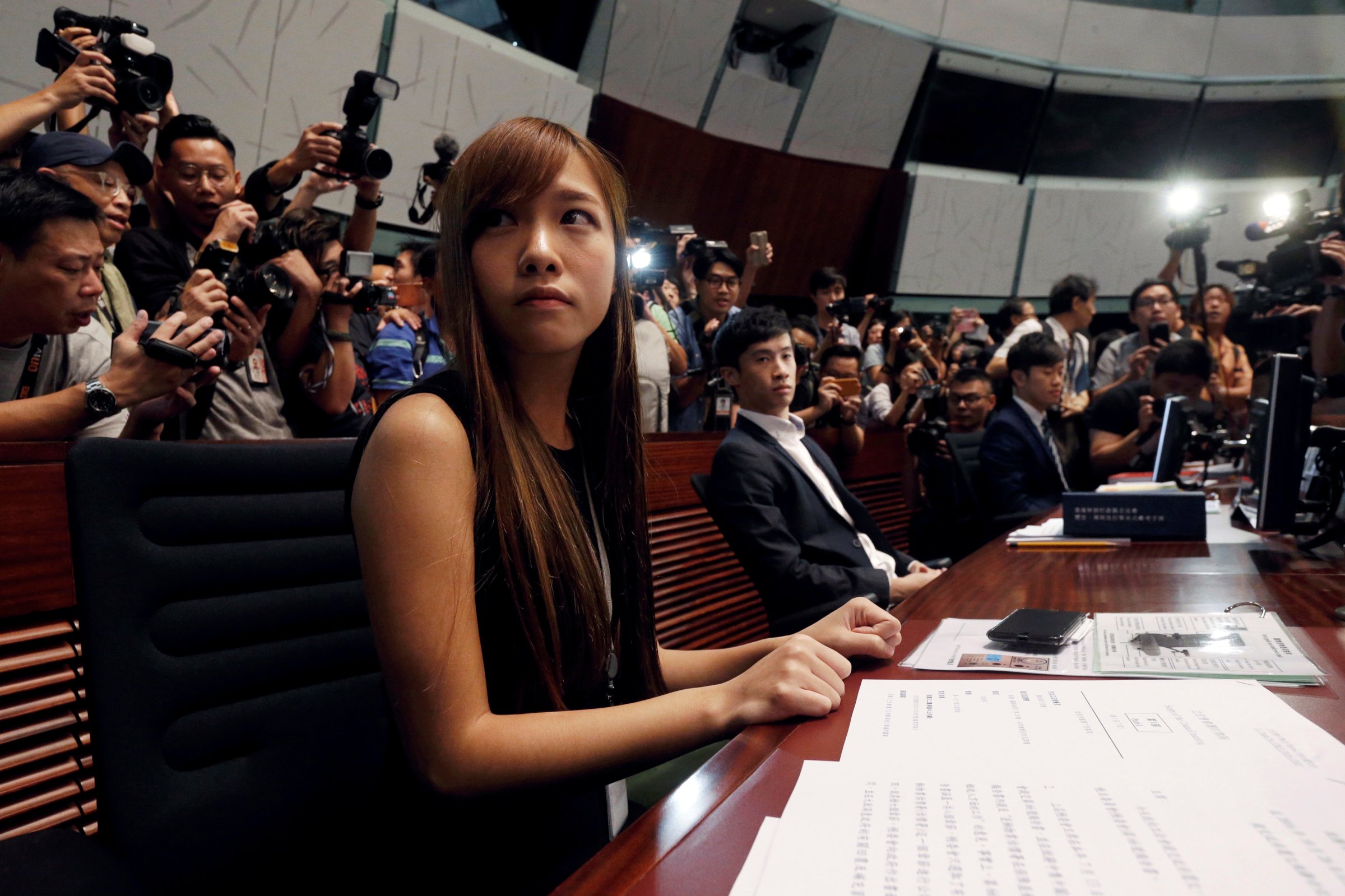
The tallest skyscraper on the western end of Hong Kong Island is the Chinese government’s Liaison Office, where representatives of the Communist Party in Beijing go about their business watching over China’s freest city and an increasingly restive one. What might otherwise be a reasonably nondescript tower is made gaudy by the presence of a glass-plated panopticon at its top, giving a cartoonish impression of surveillance — as if some comic book supervillain is brooding on the other side of the glass, staring out at the metropolis below.
This past Sunday night, as many as 10,000 anti-China protesters convened outside the building — the largest political demonstration to turn violent since the pro-democracy Umbrella Movement protests of 2014. Many of them wore black face masks, to protect themselves from the police pepper spray dispersed and to prevent themselves from being recognized on footage of the protest that was being recorded on exterior security cameras. They occupied the intersection outside the Liaison Office until the early hours of Monday morning. Some lobbed bottles at stoic lines of riot cops. Others screamed in support of Hong Kong’s independence from Chinese rule.
Twenty-four hours earlier, 25-year-old Yau Wai-ching was eating pizza. The Italian restaurant in which she sat was on a quiet corner in Sheung Wan, an old mercantile neighborhood that in the past decade has been gentrified and overrun by white expatriates mostly unconcerned with local politics. Still, she wore a pair of black-framed eyeglasses and an oversized beret to obscure her appearance. Earlier that week, she told me, a reporter from a local tabloid had trailed her as she took a taxi home, attempting to uncover dirt about her sex life. As she ate, her phone buzzed with angry messages from her political detractors, but she didn’t pay it much attention. She wanted few distractions this night, because after dinner, she had a meeting to discuss the following day’s protests. She was, after all, responsible for them.
“I get a lot of hateful messages on Facebook, saying that things wouldn’t look so bad had I not stirred up so much,” she says archly, sipping her glass of Riesling. “But not many people tell me they regret voting for me.”
Yau is one of several young political activists who won seats in Hong Kong’s Legislative Council elections in September. It was a noteworthy feat — Hong Kong’s lawmakers tend to be career politicians or businessmen, and almost never younger than 30, as three of them now are. It also reflected a rising anxiety over Beijing’s interference in the semiautonomous territory. Yau in particular is unabashed in her resentment of what she describes as liberal Hong Kong’s “colonial” status within the world’s largest communist superpower.
She made this clear on Oct. 12, when the members of the new Legislative Council gave their oaths of office. Instead of pledging allegiance to China and to Hong Kong’s constitution, she and her party colleague, 30-year-old Sixtus “Baggio” Leung Chung-hang, put on a performance.
Leung wrapped himself in a navy blue flag emblazoned with the words “Hong Kong Is Not China”; Yau unfurled a similar banner over the dais. Both of them swore loyalty to the “Hong Kong Nation,” a mantra of the nascent movement calling for the territory’s independence. When she invoked Hong Kong’s formal name, she called it the Hong Kong Special Administrative Region “of the People’s Ref-cking of Shina” — a dated Japanese variant of China that evokes memories of Japan’s brutal occupation of the mainland during World War II.
Political pandemonium ensued. First it was the local press, vilifying the two of them for their conduct — particularly for their use of Shina. Whether the press was reflecting public sentiment, or public sentiment echoed what it heard in the press, is irrelevant.
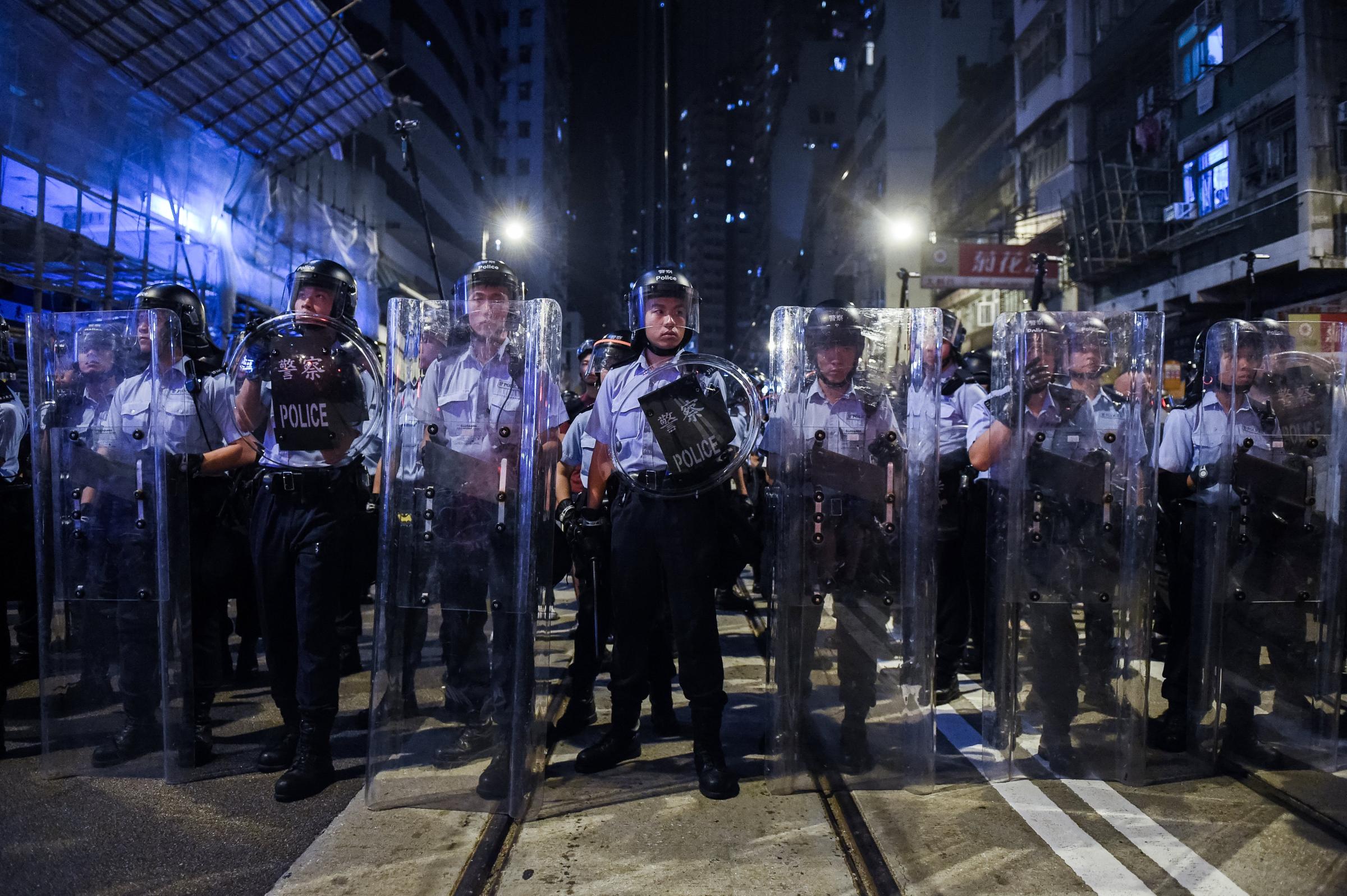
“Of course freedom is dwindling, and gradually the bad things of mainland China will inevitably seep into Hong Kong,” 65-year-old Lee Kam-wah, a local man out spending Saturday afternoon with his family in the middle-class neighborhood of Whampoa Garden, said recently. “But they really went over the line with their speech.”
Then came the government. On Oct. 18, a week after the oath-taking fiasco, Chief Executive Leung Chun-ying launched a judicial inquiry into whether Yau and Leung would be allowed to retake their oaths, calling their first attempt “insulting and unacceptable.” Leung is deeply unpopular, and his move was widely seen as a ploy to curry favor with Beijing in advance of his reelection efforts next March.
Late last week, it was learned that Leung’s judicial review would not be necessary. Beijing’s top legislative body, the National People’s Congress Standing Committee (NPCSC) announced that it would interpret the Hong Kong’s de facto constitution, known as the Basic Law, in order to decide Yau and Leung’s political fates. It was a move, many said, that adulterated the legislative and judicial independence awarded to Hong Kong, which since the end of British colonial rule in 1997 has been guaranteed a “high degree of autonomy” by Beijing.
The consensus among many Hong Kongers, especially young ones, was that the oath was offensive but Beijing’s intervention is a hundred times worse. Even as Hong Kong’s democratic prospects have clouded, people have looked to the rule of law as the most crucial differential between the territory and the mainland — the vital linchpin in preserving Hong Kong’s autonomy. In an essay published in the Guardian this week, Claudia Mo, a well-known pro-democratic lawmaker, called Beijing’s intervention “the beginning of the end.”
“For a long time, Beijing has been squeezing Hong Kong, narrowing civic liberties, free media and so forth,” Willy Lam, a China expert at the Chinese University of Hong Kong, says. “But with this interpretation of the Basic Law, many people are afraid that they have opened the Pandora’s box. And now there is the possibility of protest and confrontation with police. The elements of disability are increasing.”
And so the people took to the streets on Sunday, a peaceful exercise that turned violent when protesters attempted to storm the barricades outside the Liaison Office. Police were prompted to utilize their batons and canisters of pepper spray, driving demonstrators to an intersection a block away, where they remained until past midnight. “I don’t support what [the legislators] Yau and Leung said,” 22-year-old Tong Hiu-yan, a recent university graduate, said that night. “But [mainland] interference is so much worse. That’s why we’re here.”
Nine hours later, on Monday morning, the NPCSC announced that it had made its decision. The oaths taken by Yau and Leung were invalidated, and they were possibly now disqualified from serving in the legislature. Yau seems wholly underwhelmed by this — half skepticism, half refusal to quit. Nor is she apologetic.
“If they read the oath, they can see that we’re taking on the Chinese government — not the Chinese people,” she says. “You’ve never heard of a country disqualifying a legislator elected by the people like this — unless the country isn’t a real democracy in the first place.”
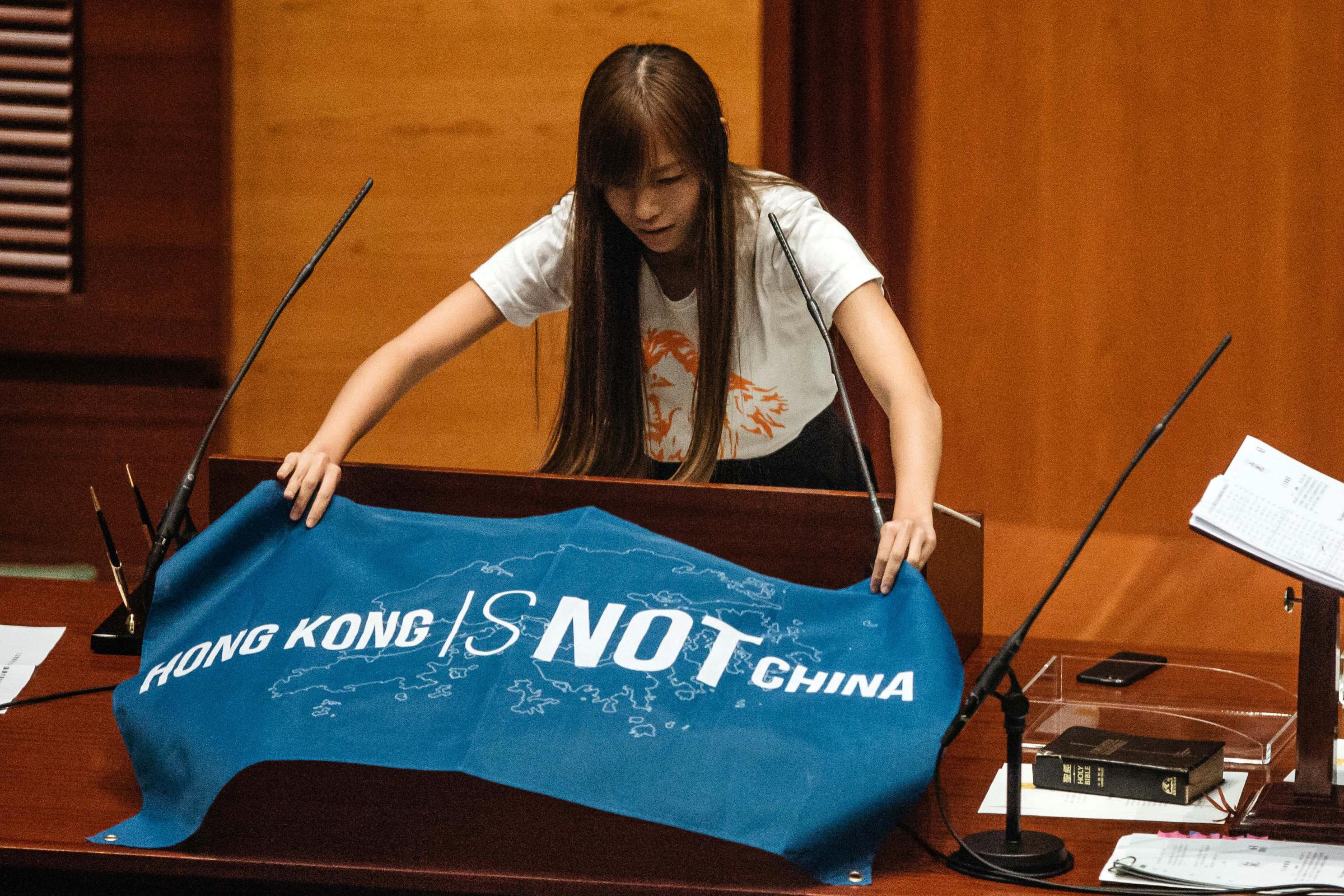
It’s fair to say that none of this is especially surprising. In 1984, Margaret Thatcher and Deng Xiaoping brokered the deal that would relinquish Britain’s last significant colony to China after nearly a century and a half of benevolent imperial rule. What the British did in Hong Kong was unequivocally incredible — taking a craggy, muggy, sparsely inhabited archipelago and transforming it into one of the world’s most important financial centers with, for those who could afford it, some of the highest quality of life available anywhere.
Both the colonial administration and the Hong Kong people themselves were deeply anxious about the prospect of being subsumed into an authoritarian communist state. By some estimates, more than a million Hong Kongers fled to countries like Canada and Australia in the years leading up to July 1, 1997, when the transfer of sovereignty was to take place. The Sino-British Joint Declaration, as the deal was called, promised Hong Kong the aforementioned “high degree of autonomy,” but no one knew what that would look like; it guaranteed the continued freedoms of press, speech, religion, and assembly, but no one knew how those freedoms would actually be protected.
The final colonial administrations began to undertake desperate democratic political reforms in a last-minute bid to bulwark Hong Kong’s liberal ethos. A lot of focus was given to the Legislative Council, a body of government-appointed lawmakers that functioned more as a clubbish cabinet to the governor than anything else. Citing “strong public support,” the government went to work democratizing the legislature, and in 1991, Hong Kongers went to the polls for the first time to directly elect some of its members.
This was the year Yau was born. Her parents were civil servants — her father in the Water Supplies Department, her mother for the local census service — and they lived in Mong Kok, a formerly gritty neighborhood that satisfies the tourist’s vision of Hong Kong: tessellations of bright neon signs over crowded streets, open-air markets selling produce and tchotchkes. Like so much of the city, it is also gentrifying, with luxury hotels and shopping malls abutting the weather-stained tenements that fewer and fewer working-class people can afford to rent.
She swears she wasn’t always a troublemaker, even though her penchant for profanity earned her the nickname “Cho Hau Mui,” which translates roughly to “Rough-Mouth Sister.” “I didn’t have particularly eye-catching grades, nor was I the teacher’s favorite,” she says. Her parents kept a strict moratorium on television watching, so instead she read — Chinese classics from the imperial dynasties, mostly. She studied these works at Lingnan University, and wrote pieces of fan fiction exploring their themes, particularly what she recognized as their latent homoerotic subtexts. This is not, as one familiar with the conservatism of Chinese literary theory will tell you, orthodox.
She still lives with her parents, who were never especially political. They voted in the Legislative Council elections for the first time this year, for their daughter. “They always thought that political issues weren’t related to them — that they wouldn’t influence their day-to-day lives,” she says. “They really don’t understand why I’ve put myself through this.”
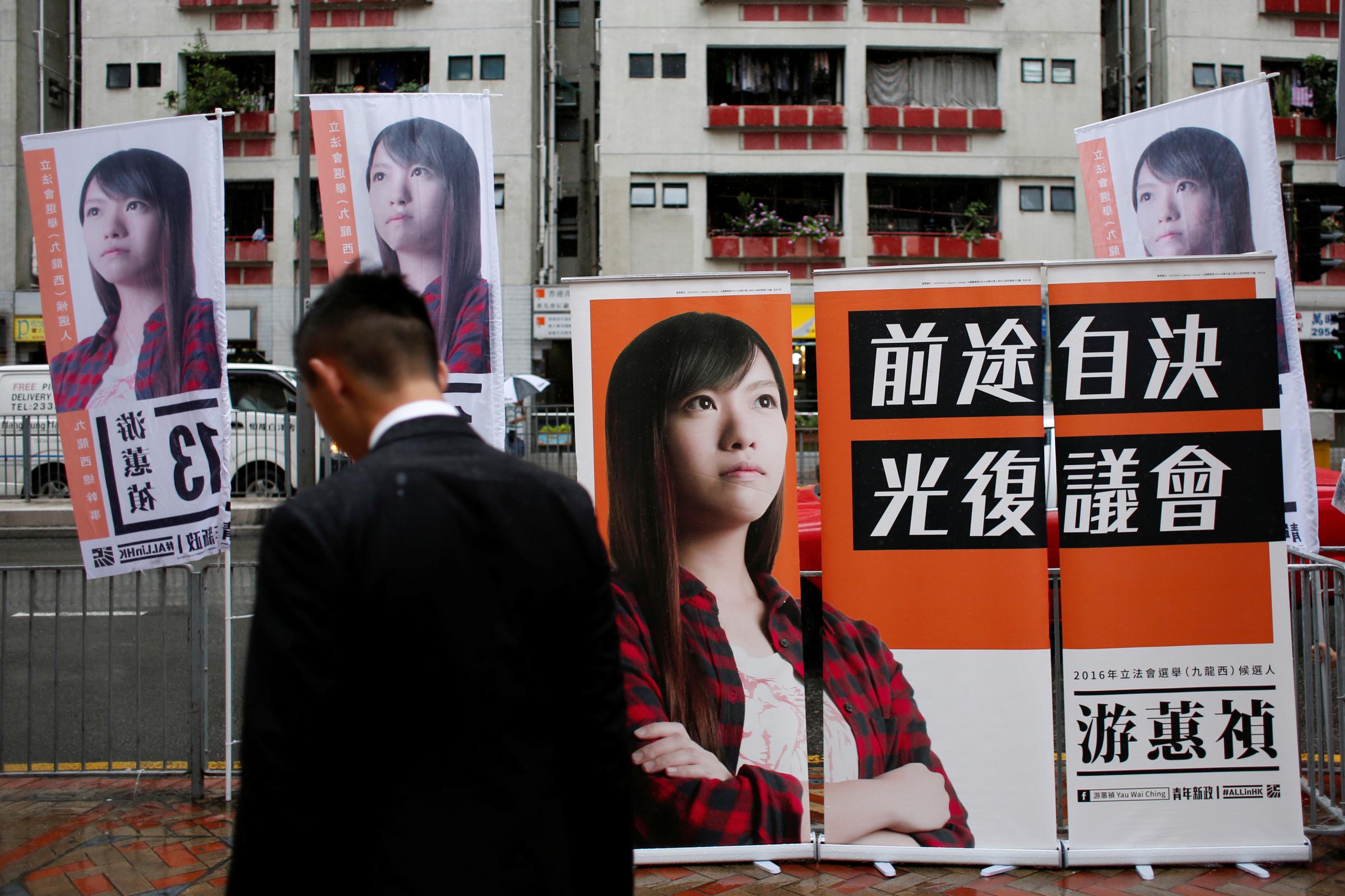
This is a common refrain. For the first decade and a half after the Handover, as the transfer of sovereignty in 1997 is known, Hong Kongers had the luxury of being apolitical. Things in Hong Kong were static in their goodness. The life expectancy remained among the world’s highest; the unemployment rate in the thick of the Great Recession barely skirted above 5%; the immaculate metro system ran on time. Beijing’s sovereignty over the territory was reasonably low-key, and to be Chinese was even a point of pride: it was China who saved the world from economic meltdown and who dazzled the planet with its phenomenal display at the 2008 Summer Olympics.
This is the peculiarity of Hong Kong under the “one country, two systems” framework: an international, cosmopolitan, informed place that is both Chinese and not. Your average Hong Konger has serious issues with the Chinese Communist Party’s intervention in the territory, but none with the more abstract idea of Chineseness — in these minds, the party and the nation are different entities.
“Some parts of the Chinese nationalism story that has been told by Beijing sometimes work in Hong Kong,” Jeffrey Wasserstrom, a historian of modern China at the University of California, Irvine, says. “There have been very intentional efforts on the mainland to elevate the atrocities committed by the Japanese to a level comparable to the Holocaust.”
This, he says, is why Yau and Leung’s use of the term Shina hit such a nerve. Hong Kong is not mainland China, where memories of the brutal Japanese invasion have been politicized and weaponized in Beijing’s recent quest for military hegemony in the region, but it did undergo its own grueling occupation at the hands of the Japanese and the rhetoric has spilled over.
“You go to have breakfast at a restaurant where people are watching T.V., and they’re saying really bad things — she doesn’t speak maturely enough, she lacks depth,” says 43-year-old Melody Ng, a real estate agent. “Now, the Legislative Council can’t meet, and real problems can’t be discussed, because of this kind of squabble. It’s messy.”
The ideological divide is drawn along generational lines. In 2012, when the local government proposed a curriculum plan known as moral-and-national education, a patriotic schooling in the glories of China’s one-party state, students here rebelled.
Yau, then 21, joined the protests, and was shaken from complacency. “It told me that the Hong Kong government was willing to become a dictatorship,” she says.
After school, she took a job as an administrative assistant at the Hong Kong Institute of Certified Accountants, handling membership applications. For two years she did that, restlessly. Outside, political storms were brewing. A scrum of young activists emboldened by the national education protests had recently embarked in a new fight: for the right to directly elect the chief executive, Hong Kong’s top leader, who is currently selected by a 1,200-person election committee that many people say picks the man Beijing tells them to. Beijing more or less affirmed this at the end of August 2014, proclaiming that the chief executive must be someone “who loves the country.”
Within weeks of this announcement, the streets of Hong Kong’s central business district were clogged with tens if not hundreds of thousands of protesters, demanding the autonomy they were promised. The movement became known as the Umbrella Revolution, because of the umbrellas used by protesters to shield themselves from the pepper spray being used by the police.
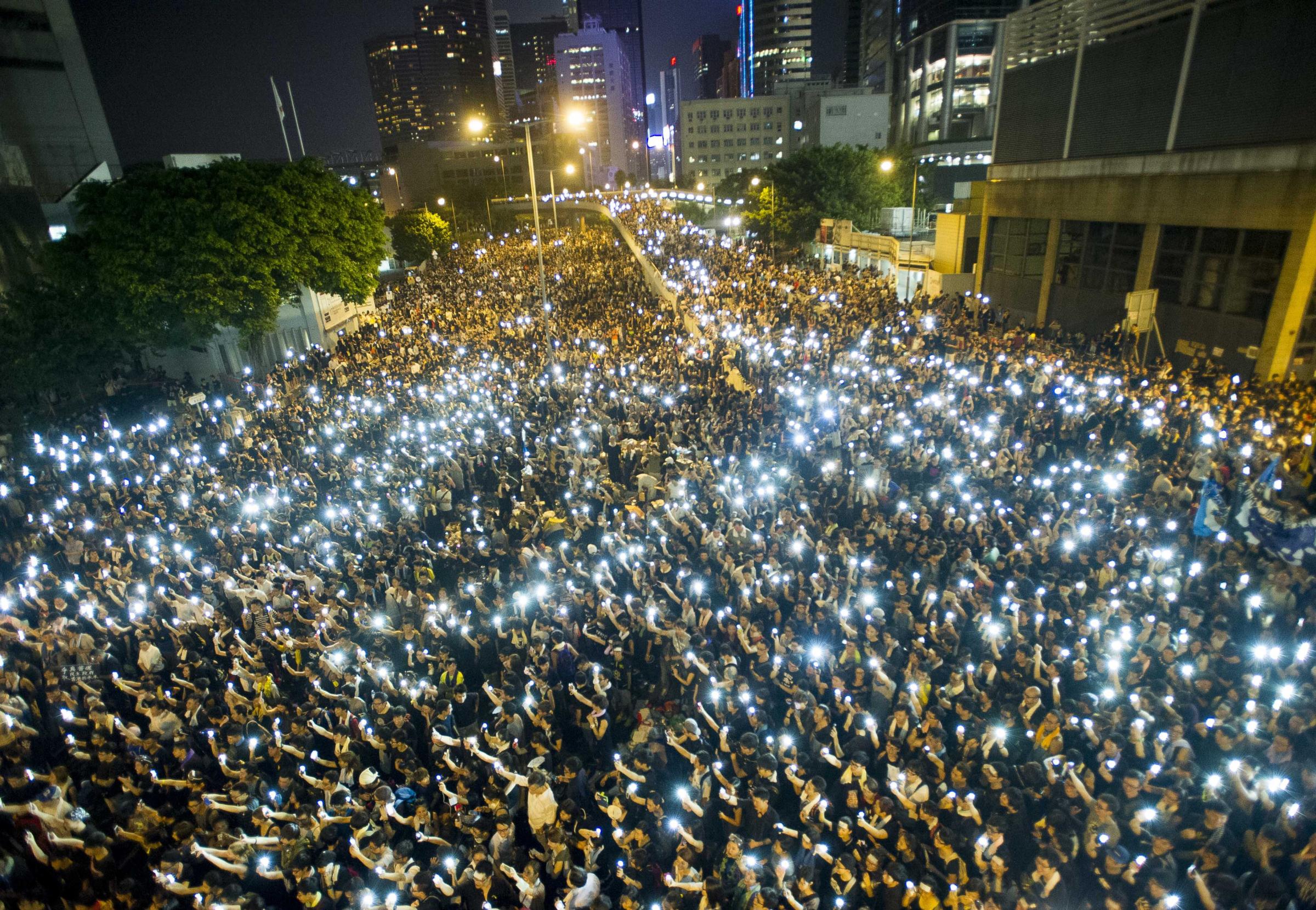
Yau showed up at the protests alone. She was eventually disheartened by what she saw: young people who, when they were not chanting in defiance, retreated to the Wine and Dine Festival on the downtown waterfront. “They were having fun, not going to war with the government,” she says. And so she returned to Mong Kok, to engage in the far more violent clashes that were going on there.
For her, and for a generation of young Hong Kongers, the Umbrella Revolution protests were a political awakening. The electoral reforms never materialized, but this only further stimulated a new activism against not only the Hong Kong government but also the overlords in Beijing. Yau wanted to dedicate herself to the fight, and began trawling Facebook political forums for opportunities. In December 2014, she came across one that suggested trying to get back seats in the district-council elections the following autumn.
This is how she met Sixtus “Baggio” Leung, a then-28-year-old digital marketer who had had a similar political epiphany. He was launching a new party, called Youngspiration, that would become more radical than the traditional pro-democracy camp — fighting not just for democratic reforms but for a repudiation of Beijing’s growing vise on Hong Kong. Localism, as the movement for greater autonomy if not outright separatism and independence is euphemistically called here, is predicated on the occasionally chauvinistic belief that Hong Kong people are simply not Chinese people, and that distance should be kept. “We want to strengthen the Hong Kong identity,” Yau explains diplomatically.
“Hong Kong is a nation: a political and economic community,” she says. “For historical reasons, this people have the same ways of life, the same culture. The main source of that is a government, but we don’t have that.”
Yau originally anticipated an auxiliary role for herself — “helping street stations or handing out leaflets or something like that” — but soon realized that unlike many of her party colleagues, she preferred the demands of politics to the demands of processing accountancy files. She ended up being among the nine Youngspiration members to run last November for a seat in the district councils, which handle political matters that are admittedly low-frequency. (Candidates tend to run on platforms promising things like dog parks and crosswalks.)
She lost. This was, she says, a blessing in disguise, because she quickly realized there were bigger fish to fry. In February of this year, over the week of Lunar New Year, a government crackdown on Mong Kok food vendors — stout yeomen seen as hardy exemplars of Hong Kong identity — escalated into the worst clash with police since the Umbrella demonstrations. Yau was there, leaving only in the early hours of the morning to bail out of jail a Youngspiration member who had been arrested in the violence.
“I realized that we needed a legislator who could stand on the side of the people,” she says. “So many political parties blamed the protests on the people — not the government.”
By then, Hong Kong was wracked with political anxiety. Two months earlier, just after Christmas, a controversial local bookseller named Lee Bo had disappeared from his warehouse on the eastern end of Hong Kong Island. He was one of the proprietors of a firm called Mighty Current Media, which published gleefully pulpy books about the scandals, real or imagined, of Beijing’s party elite: stories of power struggles, how Chinese President Xi Jinping’s wife lost her virginity, etc. They were wildly popular among tourists from the mainland, where, it goes without saying, such publications were illegal. Four of Lee’s colleagues had vanished while overseas months before, and it was soon learned that all of them had been imprisoned in the mainland.
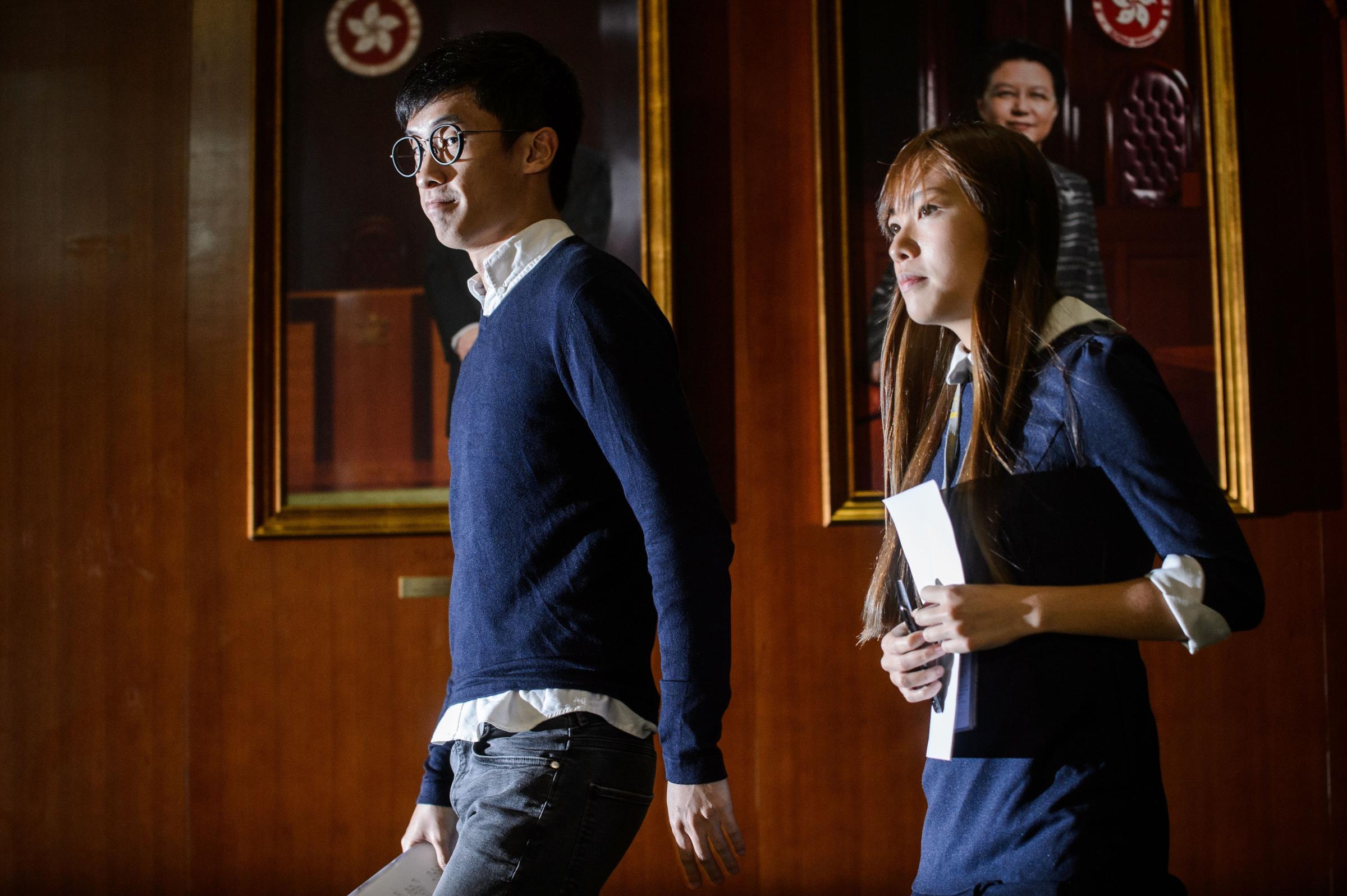
The story shocked both Hong Kong and the world as an abject violation of Hong Kong’s autonomy under the political rubric of “one country, two systems.” Earlier this month, a delegation of top brass from PEN America traveled to Hong Kong to deliver a somber report on the incident. “The threats to the civil and political rights of Hong Kong residents after 1997 are abundantly documented,” the 71-page report reads. “But the abduction of Hong Kong residents — one of them from Hong Kong soil — in apparent retaliation for their acts of expression and commerce conducted within Hong Kong raises these threats to a disturbing new level.”
It was these shocks that gave rise to the unprecedented call for Hong Kong’s independence. Once dismissed as a radical fringe, the independence movement drew thousands of Hong Kongers to a rally outside of the local government headquarters on a muggy night in August, shortly after it was announced that those supporting the movement would be banned from running in the Legislative Council elections a month later. To avoid this penalty, Yau and Leung were coy about their thoughts on the movement once they decided to run — even though, Yau says, their supporters made no secret of their support of independence.
“Most of the people in the streets were rather kind to me, not aggressive — they wanted to share these feelings, their ideas,” she says. “So I believed I would win. I could just feel it from their facial expressions.”
The results were announced at 10 in the morning the day after the election, at which point she had not slept or showered in 24 hours. She won, with more than 20,000 votes, and so did Leung, after a day at the polls marked by unprecedented voter turnout. So did 23-year-old Nathan Law, now the youngest lawmaker in Hong Kong’s history, who came to prominence during the Umbrella Movement at the side of its poster boy, the bony, bespectacled 20-year-old Joshua Wong. (Wong, who was too young to legally run for office, now splits his time managing Law’s political affairs and flying to give lectures at Yale and Oxford on democratic student movements.)
But Yau did not get to enjoy a honeymoon period after her victory. Several weeks later, while speaking on a panel, she lamented the low wages and staggering real estate prices that young Hong Kongers faced when entering the real world. “If we want to bang, there’s no room to bang in,” she said, using a Cantonese vulgarity for intercourse. “This is a very realistic problem.” Conservative local blogs and humorless online commentators quickly pounced on the story, decrying behavior they deemed unfitting of a lawmaker, and of a woman.
Hong Kong’s oppressive attitude when it comes to sex and related matters is one of the more peculiar anomalies of this otherwise cosmopolitan town. It’s the most prudish place in the world, actually, at least according to a 2008 survey cited by the South China Morning Post. More than half of the young people interviewed said they were too embarrassed to buy condoms. Yau’s decision to advocate for gay marriage during her campaign proved more controversial than her stance on Beijing. “At one point when I was campaigning in the streets, an elderly man told me off for championing LGBT rights, because he said it would cause the birthrate to drop.”
And so it is not particularly surprising that Yau has faced far more backlash than Leung for the oath-taking antics, and that, in her case, much of this backlash has pointedly concerned her gender. On Nov. 2, she and Leung held a sit-in inside the Legislative Council chamber in attempt to give their oaths once more; when security guards dragged her out, the short blue dress she was wearing got hiked up. Local media outlets mirthfully disseminated screenshots of a revealing moment. In some corners of the Hong Kong Internet, she says, people are circulating photos of a nude young woman with reddish brown hair, claiming it was her. At one recent pro-China protest, someone plastered a printout of her face on a sex doll.
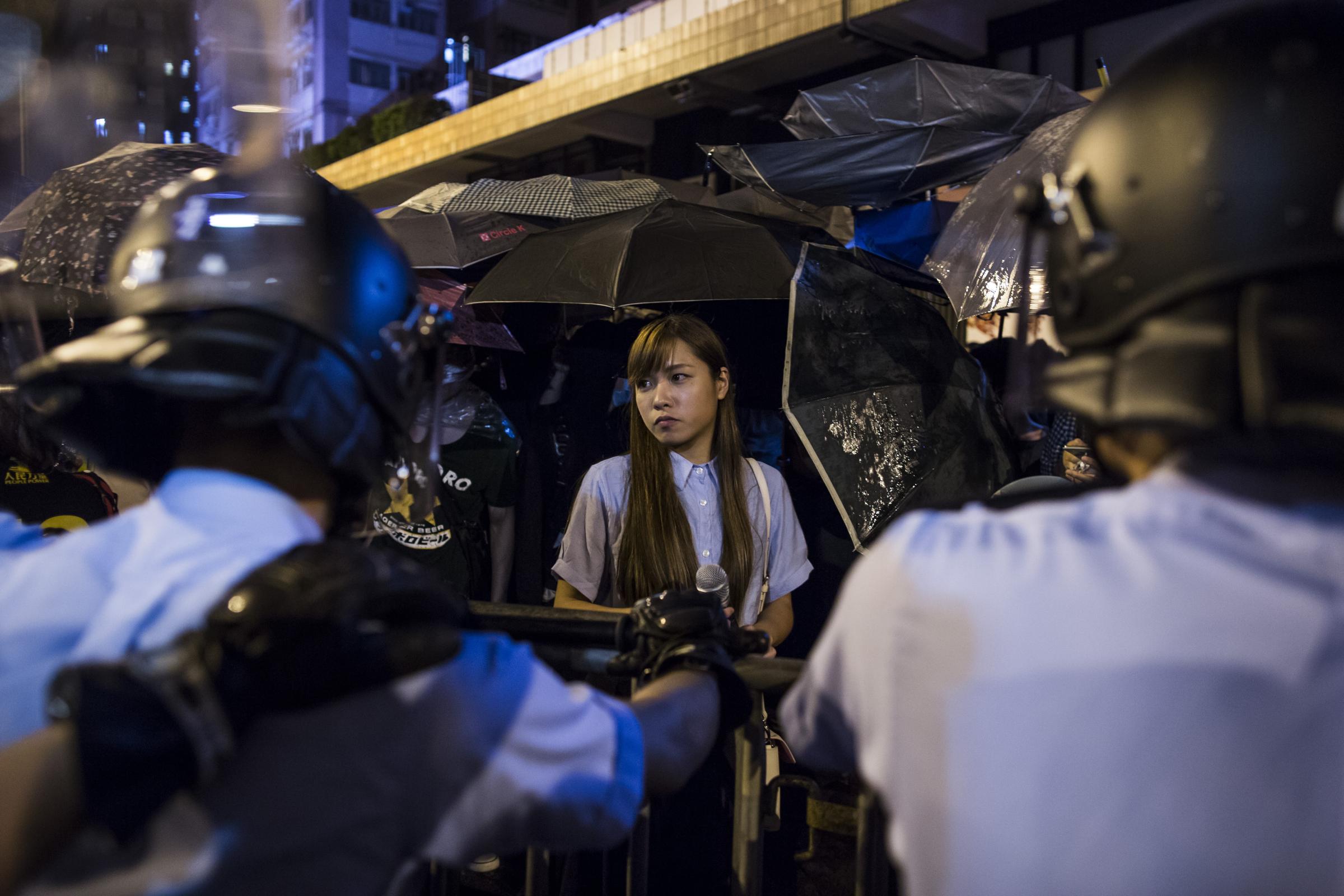
In Hong Kong, her womanhood “could easily be used as a reason to discredit her,” Joseph Cho, a lecturer in gender studies at the Chinese University of Hong Kong, says. “You have people who say her success in the election was only because she looks beautiful — comments that aren’t applicable to men.”
Yau, of stoic disposition, swears this does not faze her. She was at dinner with an uncle at a local shopping mall one recent Friday night, and two men approached her to take her photo without her permission. “She’s the one who takes the naked photos,” one of them said to his friend.
But the storm of animosity that now surrounds Yau — and Leung too — is not just the work of lecherous old men. The most profound sense of betrayal is felt by young people: the ones whose political eyes were opened by the Umbrella Revolution, who have watched as two of their young radical peers received an opportunity to enact change and effectively screwed it up.
“I don’t like how China interferes with Hong Kong affairs,” a 16-year-old girl who gave her name only as Christy said one recent Sunday afternoon, taking a break from doing her trigonometry homework at a shopping mall in Yau’s electoral constituency. “And yes, it’s inspirational to see a young woman stand up for what she believes in, but she’s making things bad for me.”
How, exactly? “I’ve always thought that when I finish my exams, there will be rewards for my hard work. But if Hong Kong’s politics are unstable, governance will be bad, maybe foreign investments will decrease or whatever, and then when I graduate, there won’t be these opportunities.”
Yau thinks her critics are missing the point.
“I’m just the same as other youngsters in Hong Kong,” she says. “Our aim is to improve the situation here. So many elderly Hong Kongers don’t understand what we’re trying to do, and what they need to realize is that we’re trying to protect what they built in the past.”
— With reporting by Kevin Lui / Hong Kong
More Must-Reads from TIME
- Donald Trump Is TIME's 2024 Person of the Year
- Why We Chose Trump as Person of the Year
- Is Intermittent Fasting Good or Bad for You?
- The 100 Must-Read Books of 2024
- The 20 Best Christmas TV Episodes
- Column: If Optimism Feels Ridiculous Now, Try Hope
- The Future of Climate Action Is Trade Policy
- Merle Bombardieri Is Helping People Make the Baby Decision
Contact us at letters@time.com